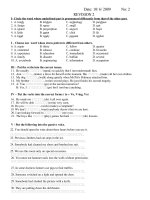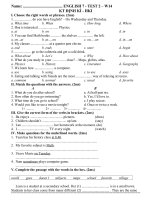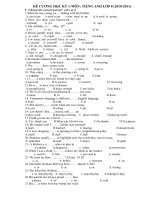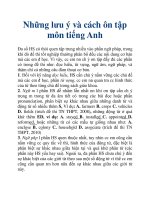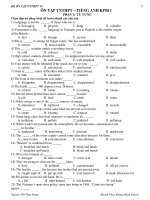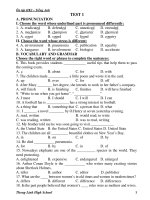Ôn tập HK1 tiếng anh 9
Bạn đang xem bản rút gọn của tài liệu. Xem và tải ngay bản đầy đủ của tài liệu tại đây (101.6 KB, 11 trang )
<span class='text_page_counter'>(1)</span><div class='page_container' data-page=1>
<b>CONDITIONAL AND WISH SENTENCES</b>
<b>*Choose A, B, C, or D to complete these sentences.</b>
1. What a pity I can’t come to the class meeting. I wish I______
<b>A. could</b> B. Can C. can D. had come
2. Ba wishes he_____ more money so he could buy a new bike
A. has <b>B. had </b> C. have D. having
3. If only I_____a bird, I could fly freely to anywhere I want.
A. am B. was <b>C. were</b> D. would be
4. I wish you _____watching television while I am talking to you
A. stop B. stops <b>C. stopped</b> D. to stop
5. I wish I earned more money, but in fact I _____
A. do B. did <b>C. don’t</b> D. didn’t
6. This is a difficult problem. I wish I _____ the answer
A. know <b>B. knew</b> C. would know D. had known
7. I can’t understand anything Marie says. I wish I _______ French.
A. can speak <b>B. could speak</b> C. speak D. speaking
8. Lan doesn’t get good marks for the test. She wishes she _____ more carefully
A. study <b>B. studied</b> C. had studied D. would study.
9. I wish I____ play the piano as well as my close friend_______
A. could / play B. can / play <b>C. could / plays</b> D. can / plays
10. If only he _____ me the truth, I don’t treat him badly.
A. tell B. tells C. told D. would tell
11. If only I ______ the trip with you next Sunday.
A. Will take B. take <b>C. would take</b> D. took
12. He wishes he_____ his home village some day.
A. visit B. visited C. will visit D. would visit
13. I wish you _____ so fast. It makes me nervous
<b>A. weren’t driving B. won’t drive C. can’t drive D. will drive</b>
14. He____ someone_____answer the telephone. It has been ringing for about five
minutes
A. wish/ can B. wish / could C. wishes / can D. wishes / would
15. The music next door is very loud. I wish they________________
<b>A. would turn it down. B. will turn it down </b>
C. can turn down it D. turn down it
16. It rains a lot here. I ____ it ______ rain so often.
A. wishes/ didn’t B. wishes /don’t C. wish /didn’t D. wish / don’t
17. I learn English very badly. I wish_____________________
A.I don’t learn English very badly. B. I learned English well
C. I didn’t learn English well D.I will learn English well.
18 “I wish we had enough time to do all the exercises” means _____________
<b>A .We doesn’t have enough time to do all the exercises.</b>
B. We didn’t have enough time to do all the exercises.
C. We have enough time to do all the exercises.
D. We will have enough time to do all the exercises.
19. I don’t think Jane will leave this Sunday. I wish She__________
A. won’t <b>B. wouldn’t</b> C. can’t D. did
20. Do you ever wish you__________ a doctor some day?
A. will become B. would become C. was D. becoming
21. We wish she _____ our teacher of English.
<b>A. were B. was C. will be D. is</b>
22. “I wish we were living in a big city” means: _____________________
A. We are living in a big city B. We were not living in a big city
<b>C. We aren’t living in a big city D. We don’t live in a big city</b>
23. There aren’t any parks in my village. I wish __________________
</div>
<span class='text_page_counter'>(2)</span><div class='page_container' data-page=2>
B. there weren’t some parks in my village.
C. there were any parks in my village.
D. there will be some parks in my village.
24. There are many accidents on the street. I wish ____________________
A. there aren’t many accidents on the street
B. there are any accidents on the street
C. there were many accidents on the street
<b>D. there weren’t any accidents on the street</b>
25. Nam doesn’t often write to his mother. Nam’s mother wishes_________
A. He writes to her more often. B. He wrote to her more often.
C. He will write to her more often. D. He would write to her more often.
26. If I _____free tomorrow, I’ll go to the mountain.
<b>A. am</b> b. will be C. were D. would be
27. It ________ quicker if you use a computer.
A. is B. will be C. has been D. would be
28. If he _____ hard today, can he have a holiday tomorrow?
A. work B. worked C. works D. will work
29. Hurry up! If we don’t hurry, we _________ late for school.
A. will B. would be C. will be D. must
30. What will you do if she ________ your invitation?
A. refuse B. will refuse C. to refuse D. refuses
31. If you take my advice, everything ________ well.
<b>A. can go B. could go C. go D. will</b>
32. ____more vocabulary if you want to be good a t English.
<b>A. Learn </b> B. To learn C. Learning D. Learnt
33. If my watch ________, I have to buy a new one because I need one.
A. broken B. is broken C. has broken D. breaks
34. If you park your car in the wrong place, you ________ pay a fine.
A. will be B. should C. have to D. could
35. If you are busy, we ________ this by ourselves.
<b>A. will do B. do C. should D. ought to do</b>
36________ you work harder, you’ll fail your final exam.
<b>A. Unless B. If C. If only D. So</b>
37. If we _____ the water, we _______no fresh water to use.
<b>A. pollute / will have </b> B. pollutes / will have
C. polluted / won’t have D. don’t pollute / will have
38. If it ___________ heavily this evening, we won’t go out for a walk.
A. doesn’t rain B. rain C. is raining D. will rain
39. If you go away, please_____ to me.
<b>A. write B. writing C. wrote D. will write</b>
40. These plants will die if you _______them regularly
A. won’t water B. don’t water C. will water D. not water
41. If he _____ faster, he’ll be the winner.
A. run B. running C. runs D. ran
42._____ I finish my homework, I can’t watch the cartoon on TV
A. If only B. so C. Unless D. If
43. I’d like to play tennis tomorrow if the weather _____ nice.
<b>A. is B. was C. will be D. were</b>
44. I’m going out now. If anybody _____while I _____ out, can you take a message?
A. phone/ am B phones/ am C phone / will be D. phones / will be
45. If you cross the red light, you________
A. will fine B. fine C. would be fined D. will be fined
46. “Unless someone has a key, we can’t get into the house” means: If someone has a
key, we ___________
</div>
<span class='text_page_counter'>(3)</span><div class='page_container' data-page=3>
C. could get into the house. D. could get into the house
47. “Unless he phones immediately, he won’t get any information” means: He won’t get
any information if ______________________
A. he phones immediately B. he didn’t phone immediately
<b>C. he doesn’t phone immediately D .he phoned immediately</b>
48. If the kitchen is in a mess, you ______clean it
A. will B. may C. ought to D. might
49. “Please let us know if the new teacher doesn’t come” means:
A. Please let us know unless the new teacher doesn’t come.
<b> B. Please let us know unless the new teacher comes.</b>
C. Please let us know if the new teacher comes.
D. Please let us know unless the new teacher came.
50. “If the librarian doesn’t go to work today, I can’t borrow any books for my report.”
means: I can’t borrow any books for my report unless______________________
A. the librarian doesn’t go to work today
<b>B. the librarian goes to work today </b>
C. the librarian didn’t go to work today
D. the librarian to work today
<b>TRANSFORMATION</b>
<b>Choose the correct sentence among A, B, C or D which has the same meaning as </b>
<b>the given one.</b>
1. I am not very tall. (1)
<b>A. I wish I were taller.</b>
B. I wish I was taller.
C. I wish I am taller.
D. I wish I was tall.
2. I am not a good student. (1)
<b>A. I wish I were a good student.</b>
B. I wish I was a good student.
C. I wish I were a excellent student.
D. I wish I am a good student.
3. He doesn’t have a computer.(1)
A. He wishes he have a computer.
B. He wishes he has a computer.
<b>C. He wishes he had a computer.</b>
D. He wishes he has had a computer.
4. She can’t swim well. (1)
A. She wishes she could swim good.
B. She wishes she swam well.
<b>C. She wishes she could swim well.</b>
D. She wishes she would swim well.
5. I don’t know your address, so I can’t write to you. (1)
<b>A. I wish I knew your address.</b>
B. I wish I know your address.
C. I wish I would know your address.
D. I wish I had knew your address.
6. I can’t speak English fluently. (1)
A. I wish I would speak English more fluently.
B. I wish I could speak English fluent.
C. I wish I speak English fluently.
<b>D. I wish I could speak English fluently.</b>
7. I live far from school. (1)
</div>
<span class='text_page_counter'>(4)</span><div class='page_container' data-page=4>
<b>D. I wish I didn’t live far from school.</b>
8. I started learning English four years ago.(3)
A. I have been learning English since four years.
<b>B. I have been learning English for four years.</b>
C. I have been learning English for years.
D. I had been learning English for four years.
9. He began learning to swim in 2005.(1)
A. He has been learning to swim in 2005.
<b>B. He has been learning to swim since 2005.</b>
C. He has been learning to swim for 2005.
D. He has been learnt to swim since 2005.
10. Vietnamese women started wearing Ao dai long time ago. (2)
<b>A. Vietnamese women have been wearing Ao dai for a long time.</b>
B. Vietnamese women has been wearing Ao dai for a long time.
C. Vietnamese women have been wearing Ao dai since long time.
D. Vietnamese women have been wearing Ao dai for a long time ago.
11. We have been playing soccer since last year. (2)
<b>A. We started playing soccer last year.</b>
B. We started playing soccer since last year.
C. We started playing soccer for years.
D. We have been playing soccer in last year.
12. Since Van arrived in America, he has been learning a lot about life on a farm. (2)
A. After Van arrived in America, he start to learning a lot about life on a farm.
B. After Van arrived in America, he starts learning a lot about life on a farm.
<b>C. After Van arrived in America, he started learning a lot about life on a farm.</b>
D. After Van arrived in America, he started learn a lot about life on a farm.
13. “ This is the most beautiful garden I’ve ever seen”. (3)
A. She tells them she has not seen such a beautiful garden before.
B. She tells them she has ever seen such a beautiful garden before.
<b>C. She tells them she has never seen such a beautiful garden before.</b>
D. She tells them she has never seen such a beautiful garden.
14. They made jean cloth completely from cotton in the 18th<sub> century.(2)</sub>
A. Jean cloth was maked completely from cotton in the 18th<sub> century. </sub>
<b>B. Jean cloth was made completely from cotton in the 18th<sub> century. </sub></b>
C. Jean cloth has been made completely from cotton in the 18th<sub> century. </sub>
D. Jean cloth were made completely from cotton in the 18th<sub> century. </sub>
15. People grow rice in tropical countries.(1)
<b>A. Rice is grown in tropical countries.</b>
B. Rice are grown in tropical countries.
C. Rice was grown in tropical countries.
D. Rice were grown in tropical countries.
16. Farmers use tractors to plow their fields.(1)
A. Tractors are used to plowed their fields.
B. Tractors are used to plowing their fields.
C. Tractors is used to plow their fields.
<b>D. Tractors are used to plow farmers’ fields.</b>
17. They teach Mathematics at school.(2)
A. Mathematics was taught at school.
B. Mathematics are taught at school.
<b>C. Mathematics is taught at school.</b>
D. Mathematics were taught at school.
</div>
<span class='text_page_counter'>(5)</span><div class='page_container' data-page=5>
B. An English test will be do tomorrow.
C. An English test will do tomorrow.
D. An English test will be did tomorrow.
19. The gate is painted once a year.(3)
A. They painted the gate once a year.
<b>B. They paint the gate once a year.</b>
C. They are painting the gate once a year.
D. They will paint the gate once a year.
20. Food can’t be sold on the sidewalk.(3)
<b>A. They can’t sell the food on the sidewalk.</b>
B. They can’t sold the food on the sidewalk.
C. They can’t be sold the food on the sidewalk.
D. They can’t selling the food on the sidewalk.
21. We must keep our school yard green and tidy.(2)
A. Our school yard must be keep green and tidy.
B. Our school yard must keep green and tidy.
<b>C. Our school yard must be kept green and tidy.</b>
D. Our school yard must be keping green and tidy.
22. We should love children.(1)
A. Children should be love.
B Children shouldn’t be loved.
<b>C. Children should be loved.</b>
D. Children shouldn’t be love.
23. The farmers are harvesting the crops. (2)
<b>A. The crops are being harvested by the farmers.</b>
B. The crops are harvested by the farmer.
C. The crops is being harvested by the farmers.
D. The crops are being harvesting by the farmers.
24. The students are doing a dictation. (2)
A. A dictation is done by the students.
<b>B. A dictation is being done by the students.</b>
C. A dictation is being do by the students.
D. A dictation is being did by the students.
25. They are going to build a university in our province.(2)
A. A university is going to be build in our province.
<b>B. A university is going to be built in our province.</b>
C. A university is going to built in our province.
D. A university are going to be built in our province.
26. A.G Bell invented telephone in 1876. (2)
A. Telephone was inventted by A.G Bell in 1876.
<b>B. Telephone was invented by A.G Bell in 1876.</b>
C. Telephone is invented by A.G Bell in 1876.
D. Telephone were invented by A.G Bell in 1876.
27. No one can treat children badly.(3)
<b>A. Children can’t be treated badly.</b>
B. Children can’t be treatted badly.
C. Children can be treated badly.
D. Children can treated badly.
28. He said to the boys ,“ Please bring me some hot water”. (1)
A. He told the boys to bring me some hot water.
</div>
<span class='text_page_counter'>(6)</span><div class='page_container' data-page=6>
A. She said, “ I could go out after 8 p.m”.
B. She said, “ She can’t go out after 8 p.m”.
<b>C. She said, “ I can’t go out after 8 p.m”.</b>
D. She said, “ She couldn’t go out after 8 p.m”.
30. He said to his students ,“ Don’t be late for class tomorrow”. (2)
<b>A. He told his students not to be late for class the day after.</b>
B. He told his students not to be late for class the day before.
C. He told his students don’t be late for class the day after.
D. He told his students to be late for class the day after.
31. “John, please don’t tell anyone about my new address”, said Mary. (2)
A. Mary asked John not to tell her new address about anyone.
B. Mary asked John not to tell someone her new address.
<b>C. Mary asked John not to tell anyone about her new address.</b>
D. Mary asked John not to tell his new address about someone.
32. “ I must go to the school library now” John said. (2)
A. John said he had to go to the school now.
<b>B. John said he had to go to the school then.</b>
C. John said he must go to the school then.
D. John said he have togo to the school then.
33. He said that he was going to have a new school bag. (3)
<b>A. “ I am going to have a new school bag” he said.</b>
B. “ I was going to have a new school bag” he said.
C. “ He was going to have a new school bag” he said.
D. “ He is not going to have a new school bag” he said.
34. “ Do you want to help me?” Tom asked Mary. (1)
A. Tom asked Mary if she wanted her to help him.
B. Tom asked Mary if she wants him to help her.
<b>C. Tom asked Mary if she wanted to help him.</b>
D. Tom asked Mary if she wanted him to help her.
35. “ May I sit here in this classroom?” Peter asked his friends. (3)
A. He asked his friends if he may sit there in that classroom with his friends.
B. He asked his friends if he might sit here in that classroom with his friends.
C. He asked his friends if he might sit there in this classroom with his friends.
<b>D. He asked his friends if he might sit there in that classroom with his friends.</b>
36. “ I will work for an international bank tomorrow” Mrs. Nga said. (2)
<b>A. Mrs. Nga said she would work for an international bank the following day.</b>
B. Mrs. Nga said she would work for an international bank tomorrow.
C. Mrs. Nga said she would work for an international bank day after.
D. Mrs. Nga said she would work for an international bank day before.
37. “ We are very happy to see you here” the students said to Mr. White. (2)
<b>A. The students said to Mr. White that they were very happy to see him there.</b>
B. The students said to Mr. White that they was very happy to see him there.
C. The students said to Mr. White that they were very happy to see him here.
D. The students said to Mr. White that they are very happy to see him there.
38. Water these plants or they will die. (2)
A. If you water these plants, they will die.
B. If you did not water these plants, they will die.
<b>C. If you don’t water these plants, they will die.</b>
D. If you are watering these plants, they will die.
39. If John keeps studying as he has been, he will pass his exams.(3)
<b>A. John is studying hard to pass his exams.</b>
B. John will not pass his exams because he is not studying.
C. John has passed his exams.
</div>
<span class='text_page_counter'>(7)</span><div class='page_container' data-page=7>
40. Start at once or you will be late for school.(3)
A. If you started at once, you wouldn’t be late for school.
B. Unless you start at once, you won’t be late for school.
C. You won’t be late for school if you didn’t start at once.
<b>D. If you don’t start at once, you will be late for school.</b>
41. He is very lazy, so he can be punished.(1)
A. Because he is very lazy, he can’t be punished.
<b>B. Because he is very lazy, he can be punished.</b>
C. Although he is very lazy, he can be punished.
D. Although he is very lazy, he can’t be punished.
42. Nam worked hard, so he passed his exam. (1)
A. Because Nam worked hard, he didn’t pass his exam.
<b>B. Because Nam worked hard, he passed his exam.</b>
C. Because Nam didn’t work hard, he passed his exam.
D. Because Nam worked hardly, he passed his exam.
43. I didn’t go to school early because it rained heavily. (1)
A. It didn’t rain heavily, so I didn’t go to school early.
B. It rained heavily, so I went to school early.
<b>C. It rained heavily, so I didn’t go to school early.</b>
D. It rained heavily, I went to school early.
44. The sea was rough, so the ferry couldn’t sail. (2)
A. The ferry could sail because the sea was rough.
B. The ferry couldn’t sail because the sea was not rough.
<b>C. The ferry couldn’t sail because the sea was rough.</b>
D. The ferry could sail although the sea was rough.
45. We got lost because we didn’t have a map. (1)
<b>A. We didn’t have a map, so we got lost.</b>
B. We didn’t have a map, so we didn’t get lost.
C. We had a map, and we got lost.
D. We had a map, but we got lost.
46. The film was so boring that I fell asleep. (2)
A. I fell asleep, so the film was so boring.
<b>B. I fell asleep because the film was so boring.</b>
C. I fell asleep although the film was so boring.
D. I fell asleep but the film was so boring.
47. Learning English is very interesting.(1)
<b>A. It is very interesting to learn English.</b>
B. It is very interesting to learning English.
C. It is very interesting to be learn English.
D. It is very interesting learnig English.
48. Walking in the rain gives him pleasure. (2)
<b>A. He enjoys walking in the rain with pleasure.</b>
B. He enjoys walk in the rain with pleasure.
C. He enjoys to walk in the rain with pleasure.
D. He enjoys walked in the rain with pleasure.
49. He loves reading books.(1)
A. He enjoys read books.
B. He enjoys to read books.
<b>C. He enjoys reading books.</b>
D. He enjoys to reading books.
50. I love watching sports. (2)
</div>
<span class='text_page_counter'>(8)</span><div class='page_container' data-page=8>
D. I am not interested in watching sports.
<i><b>TEXT 1 </b></i>
When Malaysia became (1)________ , Malay language was chosen as the
National Language. The reason (2)________ this choice is that it is the language of the
Malays who are the natives of Malaysia.
The (3)________ of Malaysia takes pride in promoting this language among
all the races in Malaysia. The Chinese, the Indians and other non-Malay communities
(4)________the decision of the government. It is the (5)________ language (6)________
the country.
In Malaysia, the national language is (7)________ the Bahasa Malaysia. It is
the language of (8)________ in schools. Since the introduction of Malay in schools, it
(9)________ the most (10)________ used language in Malaysia.
1. A. independence B. independently C. dependent <b>D.</b>
<b>independent </b>
2. <b>A. for </b> B. in C. since D. at
3. A. govern <b>B. government </b> C. governor D. governing
4. A. has accepted <b>B. have accepted </b> C. is accepted D.are
accepted
5. A. office <b>B. official </b> C. officer D. officially
6. A. in B. to <b>C. of </b> D. for
7. A. call B. calling C. to call <b>D. called</b>
8. <b>A. instruction </b> B. instruct C. instructive D.
instructively
9. <b>A. has become </b> B. have become C. has became D. have
became
10. A. wide B. widen <b>C. widely </b> D. widening
<i><b>TEXT 2</b></i>
Clothes
Clothes can tell a lot about a person. Some like colorful (1)________
because they want everyone to (2)________ at them and they want to be the centre of
attention. (3)________ people like to wear nice clothes, but their clothes are colorful and
fancy. They do not want people to look at them. Clothes today are very different
(4)________ the clothes of the 19th<sub> century. One different is the way they look. For</sub>
example, in the 19th<sub> century, all women (5)________ blouses with long skirts. But today,</sub>
(6)________ do not always wear blouses with long skirts. Sometimes they wore short
skirts. Sometimes they wear pants. Another different between the 19th<sub> century</sub>
(7)________ today is cloth. In the 19th<sub> century, clothes (8)________made only from</sub>
natural kinds of cloth. They were made from (9)________ , wool, silk or line. But today,
there are many kinds of man-made cloth. A lot of clothes are now made (10)________
nylon, rayon, or polyester.
1. <b>A. clothes </b> B. suits C. shirts D. trousers
2. A. see B. watch <b>C. look </b> D. laugh
3. A. Some B. Few C. The <b>D. Other </b>
4. A. of <b>B. from </b> C. with D. on
5. A. wear B. worn C. wearing <b>D. wore </b>
6. A. children <b>B. women </b> C. men D. students
7. <b>A. and </b> B. but C. from D. with
8. A. are <b>B. were </b> C. will be D. have
been
</div>
<span class='text_page_counter'>(9)</span><div class='page_container' data-page=9>
10. A. by B. with C. in <b>D. from </b>
<b>TEXT 3</b>
My village
My village is about 50 kilometers (1)________ the city center. It is a very
beautiful and (2)________ place where people (3)________ flowers and vegetables only.
It’s very famous for its pretty roses and picturesque scenery. The air is quite (4)________ ;
however, the smell of roses makes people (5)________ cool.
(6)________ spring, my village looks like a carpet with plenty of (7)________ .
Tourists come to visit it so often. Nowadays, with electricity, it doesn’t take the
(8)________ much time to water the roses. And even (9)________ night, people can walk
along the path and (10)________the fresh smell of the flowers.
1. A. on B. for <b>C. from </b> D. since
2. A. peace <b>B. peaceful </b> C. peacefully D. quite
3. <b>A. grow </b> B. buy C. grew D. bought
4. A. dirty B. hot C. bad <b>D. fresh </b>
5. A. felt B. to feel <b>C. feel </b> D. feeling
6. <b>A. In</b> B. On C. At D. For
7. <b>A. colors </b> B. colorful C. spots D. styles
8. A. villages B. towns <b>C. villagers </b> D.
city-dwellers
9. A. in B. above C. on <b>D. at </b>
10. A. enjoyment <b>B. enjoy </b> C. enjoyably D. enjoyable
<b>TEXT 4</b>
“ Speech is one of the most (1)________ ways of communicating. It consists of far
more than just (2)________ noises. To talk or to be understood by other people, we have to master
a language, that is, we have to use combinations of sound that (3)________ for a particular object
or idea. Communication (4)________ impossible if everyone (5)________ up their own language.
Learning a language is very important. The basic vocabulary of English is not very
large, and only 2,000 words are needed to speak (6)________ quite well. But the more words you
know, the more ideas you can express, and the more precise you can be (7)________ their
meaning.
Words are the main things we use (8)________ what we want to say. The way we
say the words (9)________ also very important. One tone of voice can express (10)________
emotions and show whether we are pleased or angry for instance.”
1. A. importance B. unimportance <b>C. important </b> D. unimportant
2. A. make <b>B. making </b> C. to make D. makes
3. A. to stand B. stands C. standing <b>D. stand </b>
4. A. will be B. is <b>C. would be </b> D. was
5. <b>A. made </b> B. makes C. make D. will make
6. A. its B. them <b>C. it </b> D. they
7. A. for B. of C. in <b>D. about </b>
8. A. to expressing <b>B. in expressing </b> C. expressed D. to be
expressed
9. <b>A. is </b> B. are C. will be D. was
10. A. much <b>B. many </b> C. few D. little
<b>TEXT 5</b>
TELEPHONE
</div>
<span class='text_page_counter'>(10)</span><div class='page_container' data-page=10>
When you pick up your phone, it instantly hooks up with a vast, worldwide telephone
(5)________. The network has million miles of wire. It has cables that run (6)________ the oceans.
It has optical(glass) fibers as thin as a hair. It has satellites that orbit high above (7)________.
It has powerful computers that (8)________ track of everything on the network,
including the (9)________ to your friend. The word “hello” might have zipped through wires, shot up
to a satellite, or zoomed through a cable under the sea before it got to your (10)________ .
1. A. stands <b>B. lives </b> C. runs D. sleeps
2. A. shoes B. pen C. key <b>D. telephone </b>
3. A. sound B. words <b>C. voice </b> D. accent
4. <b>A. what </b> B. which C. that D. whom
5. <b>A. network </b> B. system C. school D. place
6. A. on B. in C. above <b>D. under </b>
7. A. the moon B. the sun <b>C. the earth </b> D. the star
8. <b>A. keep </b> B. catch C. have D. make
9. A. letter <b>B. call </b> C. address D. talk
10. A. mouth B. head C. eyes <b>D. ear </b>
<b> PHONETICS:</b>
<b>* Choose the word in each line that has the underlined italic part pronounced</b>
<b>differently from the rest:</b>
1. A. c<i><b>o</b></i>mprise <b>B. tr</b><i><b>o</b></i>pical C. c<i><b>o</b></i>mpulsory D. maus<i><b>o</b></i>leum
2. A. d<i><b>i</b></i>fferent B. diff<i><b>i</b></i>cult <b>C. inv</b><i><b>i</b></i>te D. v<i><b>i</b></i>sit
3. A. add<i><b>ed</b></i> <b>B. mention</b><i><b>ed</b></i> C. print<i><b>ed</b></i> D. start<i><b>ed</b></i>
4. A. <i><b>s</b></i>ymbol B. <i><b>s</b></i>weater C. in<i><b>s</b></i>piration <b>D. de</b><i><b>s</b></i>ign
5. A. p<i><b>i</b></i>cnic B. shr<i><b>i</b></i>ne C. s<i><b>i</b></i>ghtseer D. h<i><b>i</b></i>ke
6. A. bl<i><b>a</b></i>nket B. g<i><b>a</b></i>ther C. rel<i><b>a</b></i>x <b>D. exch</b><i><b>a</b></i>nge
7. A. f<i><b>or</b></i>mal B. d<i><b>or</b></i>mitory C. m<i><b>or</b></i>ning <b>D. f</b><i><b>or</b></i>get
8. A. comp<i><b>u</b></i>ter <b>B. incl</b><i><b>u</b></i>de C. introd<i><b>u</b></i>ce D. instit<i><b>u</b></i>te
9. A. w<i><b>e</b></i>bsite B. d<i><b>e</b></i>ny C. r<i><b>e</b></i>mote D. r<i><b>e</b></i>spond
10. A. art<i><b>i</b></i>cle <b>B. v</b><i><b>i</b></i>olent C. op<i><b>i</b></i>nion D. benef<i><b>i</b></i>t
<b>* Choose the word in each line that has different stress pattern:</b>
11. A. provide B. Malaysia C. although <b>D. currency</b>
12. A. enjoy B. religion <b>C. Hinduism</b> D. around
13. A. Malaysian <b>B. pen pal</b> C. impress D. enjoy
14. A. Korea <b>B. China</b> D. Japan D. Malaysia
15. A. design B. mention C. poetry D. modern
16. A. addition <b>B. visited</b> C. continue D. designer
17. A. minority B. majority C. traditional <b>D. inspiration</b>
18. A. fashion B. tunic D. novel <b>D. survive</b>
19. A. collection <b>B. grocery</b> C. locate D. pagoda
20. A. mountain B. weekend <b>C. enjoy</b> D. gather
21. A. exchange <b>B. scenery</b> C. towards D. compose
</div>
<span class='text_page_counter'>(11)</span><div class='page_container' data-page=11>
23. A. television B. information C. comprehension D. documentary
24. A. benefit B. wonderful <b>C. advantage</b> D. newspaper
25. A. opinion B. develop <b>C. internet</b> D. convenient
26. A. beginner B. invention C. detection <b>D. information</b>
<b>PREPOSITIONS</b>
1. Foreign tourists are really impressed ... the beauty of the city.
A. of <b>B. by</b> C. with D. about
2. Malaysia is divided ……. two regions.
A. in <b>B. into</b> C. with D. from
3. The flight from Kuala Lumpur arrived in HaNoi ……….noon.
A. in <b>B. at</b> C. of D. for
4. He doesn’t depend ………. his parents.
A. in <b>B. on</b> C. at D. for
5. Jean cloth does not wear out easily because it is made completely………. cotton
A. from B. by C. in D. out of
6. That kind of cloth is very strong and it does not wear ……….. easily
A. out B. off C. on D. in
7. Can you tell me how many chapters this book consists ……….. .?
A. in B. to <b>C. of</b> D. at
8. Hanoi is not different ………. Kuala Lumpur.
<b>A. from</b> B. with C. to D. by
9. He arrived in England ……….. Thursday afternoon.
A. on B. in C. at <b>D. for</b>
10. Mrs. Paker works part-time ……….. a grocery store in a nearby town.
A. on <b>B. at</b> C. under D. above
11. Many people like going there ………. their weekends.
A. on <b>B. for</b> C. at D. in
12. We usually go to our home village at least once ……….the summer.
<b>A. in</b> B. for C. at D. by
13. Paola said that she was really interested ………. learning Vietnamese.
<b>A. in</b> B. about C. of D. on
14. Nga’s studying English ………. her work.
A. at B. in C. for D. week
15. Hundreds of books are written ………. English every day in many countries.
A. by <b>B. in</b> C. with D. about
16. I saw your school’s advertisement ……… today’s edition of the Viet Nam news
<b>A. in</b> B. for C. on D. of
17. Nowadays, people can get a lot of benefits ………. television.
<b>A. from</b> B. to C. in D. on
18. It’s quite easy to get access ……….. the internet nowadays.
A. in <b>B. to</b> C. of D. with
19. My brother is a journalist. He writes ………. Tuoi Tre newspaper.
A. in B. into C. with <b>D. for</b>
20. instead………. Going to the theater, we’ll go to the exhibition.
</div>
<!--links-->
